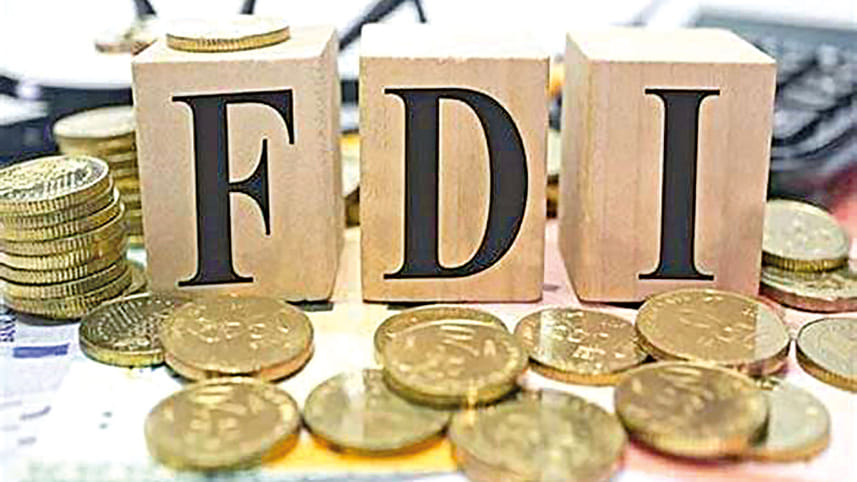The impact of COVID-19 on Global FDI and Bangladesh Economy

COVID-19 pandemic has adversely affected the worldwide economy, causing slowdown of business activities and economic contractions. This will have an inevitable negative impact of investment flow in Bangladesh as potential investors are in doubt about market uncertainties and existing investors are limiting their resource mobilisation.
A report by the United Nations Conference on Trade and Development (UNCTAD) identified a 42% fall in the global FDI to an estimated USD 859 billion in 2020 from USD 1.5 trillion in 2019. However, the decline in FDI flows across the developing economies was uneven as developing nations in Asia performed better owing to positive FDI inflows to China and India in the high-tech sectors in terms of merger and acquisition in ICT and pharmaceutical respectively. Apart from these two nations, FDI flows in the ASEAN and South-Asian economies fell. Most of these investments are tied to export-oriented apparel sectors that suffered from global demand slump.
A fall in greenfield investments, cross border mergers and acquisition and infrastructure project finance deals for the year is also noticed from 2020 onwards. Among these, greenfield investments, referring to FDI in which a company starts its operation in other countries from scratch, are of major concern for developing economies as it fell by 38% in Asia. The overall FDI trend remains weak in 2021 and as investors remain cautious in committing capital to new overseas operations and assets, greenfield investments are likely to reduce further by the year end. With this being estimated, it is deemed that global FDI flows is likely to recover from at least 2022 and onwards and such flow coming from mergers and acquisition rather than from greenfield investments. However, reinvestments remained relatively stable in comparison during this period. Among the few sectors that showed an upward trend in value and FDI, ICT and international project finance deals in the health and renewable energy sectors saw a rise during this pandemic period.
It was also indicated in a report from OECD in May 2020 that the pandemic hit at a time when FDI was at the second lowest level recorded during the aftermath of global financial crisis of 2007-08. Additionally, corporate debt was also recorded very high. In consequence to these factors, great clouds of doubts linger on chances of new FDI flows through mergers and acquisition and greenfield investments for the year 2021 and first half of 2022. It was noticed that reinvestment earnings becoming an increasingly important source of FDI flows in the pre-covid. This is likely to deplete further as the world is entering into another global financial depression. Intra-company loans and equity capital injections from parent companies to their struggling foreign affiliates may offset further decline in reinvested earnings.
If we consider a pessimistic scenario, we can see the uneven economic recoveries. While some sectors would have their earnings recovered, others are likely to remain below the condition prevailing before the pandemic started. It will certainly take time before the share of earnings reinvested would recover to historic levels. Overall, one has to be very optimistic to expect overall FDI flows to become positive until 2022. Although some sectors like healthcare and ICT are likely to be more attractive for FDI, disruptions caused due to the pandemic in global supply chain may lead some companies to reconsider their geographical and sectoral dispersion of their activities and shorten their supply chains and distance to clients. On the other hand, existing businesses may intend to diversify their suppliers to increase their resilience.
Bangladeshi economy has proved to be rather resilient to the shocks brought about by COVID-19 despite the global economic downturn. But, nonetheless, the trend of FDI inflows and the proposed investments have reduced significantly in comparison with previous years.
As per the IMF report released in October 2020, while the global economy is estimated to see a negative growth of -4.4% on average, Bangladesh is among the few economies with positive growth in 2020 indicating to be more macro-economic resilient. As per surveys conducted by several international institutions, Bangladesh remains among the top-five resilient economies during the pandemic adversaries and also considered as one of the prospective economies by the global business communities.
COVID-19 has indeed caused some great damage to the economy of Bangladesh and slowed down the projected rate of GDP growth. Export figures have fallen by 15% from the previous year due to slump in global demand and rambling order suspensions as well as cancellation for major export items of RMG industry; the powerhouse among the export basket of the country. Import figures have also plummet in parallel due to material import disruptions, stagnated construction works and falling fuel prices in the global economy. From bird's eye view, despite government's relentless efforts of improving the business climate of the country, FDI to Bangladesh in 2020 has reduced in terms of actual inflow as well as proposed investments due to the global recession brought about the pandemic.
The Bangladesh government has been focusing immensely on increasing both local and foreign investments through re-investments, merger and acquisitions and greenfield investments into the country. It has already adopted excellent initiatives in upgrading the port, road and rail infrastructures and powerplants, developing a large number of economic zones and making groundbreaking progress with improvement of the business climate of the country; and all of these did bring Bangladesh under the global focus as a role model of economic development in the world before the pandemic started. However, in order to continue faring this steep path of growth, the policy makers now have to do the homework and devise the correct investment related policies and strategies to attract new FDI.
The writers are Law Officer, Bangladesh Investment Development Authority under Prime Minister Office and Investment and Business Climate Consultant of an Overseas Development Partner Organization respectively.



 For all latest news, follow The Daily Star's Google News channel.
For all latest news, follow The Daily Star's Google News channel.
Comments